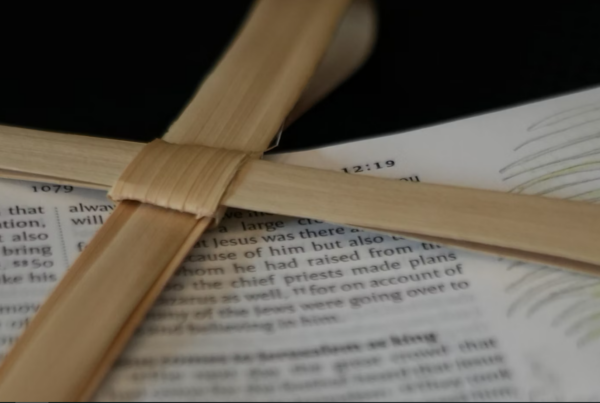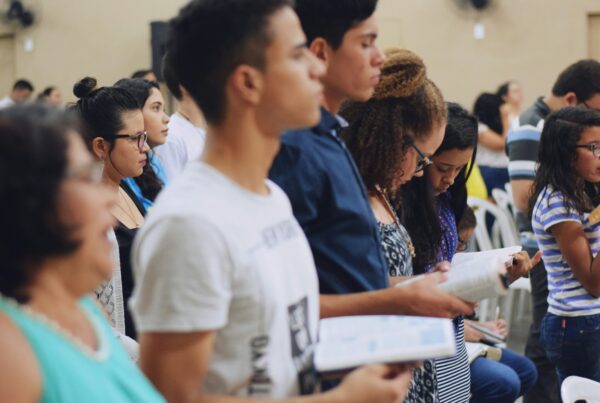Jesus recognized the power of rest, even when people were clamoring for his attention. Too many demands on our time is an all-too-familiar reality today, too, yet Jesus offers us the example of rest, and other Scripture passages throughout the Bible support a balance of work and rest.
For me, one of the most empowering passages in all of Scripture is Mark 1:35-38. Jesus has just called the first disciples and is beginning his journey to the cross. While at the home of Peter and Andrew, Jesus heals Peter’s mother-in-law. Through the evening more and more people come to the house, and Jesus heals them. By morning the entire village is gathered at the door and wanting or perhaps even demanding Jesus’s time. But he is nowhere to be found! He slipped away early in the morning while it was still dark to purposely make time to be alone and pray. When told “everyone is looking” for him, Jesus says to his friends, “Let us go somewhere else—to the nearby villages—so I can preach there also” (Mark 1:38, NRSV).
In the midst of distraction and people calling out for his time and attention, Jesus stayed focused on the greater mission. Listening for the soft whisper of God often takes stillness, solitude, and discipline.
“We cannot and do not honor Jesus, our loved ones, or the church without times of reflection and rest that come from observing Sabbath. ”
Balancing work and rest
As I was discerning my sense of call before applying to seminary, mentor Rev. Dr. Eric Blahut said to me about ministry: “It’s not a job. It’s a way of life and a way of living.” I have always taken that to heart.
When I accepted my first call, I’d been married 15 years and was the father of four daughters aged six months, two, four, and five. As a husband and father, there was no way I was turning my back or sacrificing my family. Whatever I might accomplish as a pastor is utterly meaningless if I do not first serve as a minister to my family and be present for them. Sure, I strive to serve Christ to the best of my abilities. But I simultaneously strive to be the best husband and father I can be.
An overlooked treasure from Ecclesiastes 3 is verses 12-13, “I know that there is nothing better for people than to be happy and to do good while they live. That each of them may eat and drink, and find satisfaction in all their toil—this is the gift of God” (NIV). It’s impossible to be happy and do good if we’re physically, emotionally, and spiritually drained. When we are tired and stressed, even the best of us become irritable and testy. We lose our patience. We lose our ability to reason. I’d even argue that we lose some of our ability to love. And is there anything more important than love?
We cannot and do not honor Jesus, our loved ones, or the church without times of reflection and rest that come from observing Sabbath.
Accepting rest and work as complimentary gifts from God is foreign to the world. It seems our modern culture views work as a necessary evil or something we should long to escape from while we pursue our real purpose, which culture tells us is the life of leisure.
For the children of God, work and rest are intertwined gifts. These gifts need to be embraced and held in tension without either one becoming a master. We must think of them as complimentary gifts rather than competing choices.
Finding a balance and rhythm to our work and rest—with God at the center—helps us stay attuned to our greater mission.
Nearly twenty years into ministry, I have no shame in taking daily naps. I have no shame in long walks around town quietly praying. If I’m feeling particularly inspired and work in the office till midnight, I have no problem strolling in around noon the next day. I have no shame in taking part of a day, or even a full day, to go fishing with a member of the church, and consider it “work” or visitation hours. I have no shame in taking an “extra” day off to spend with family after a particularly intense week. Once I conducted three funerals in ten days. Thankfully, at that time I had a model elder who said, “Take three days off, or whatever you need to decompress and spend time with family and doing the things you love.” These are ways I’ve found to balance work and rest, each enriching the other as I follow my call as a pastor, father, and husband.
Not every pastor has that wise elder and an understanding consistory. Ministry is a calling and a way of living. We inflict harm and violence on ourselves, those we love the most, and the church when do not balance the gifts of work and rest.
Sabbath challenges for pastors
It seems many, if not most, church members expect the pastor to follow the biblical principles for tithing and be a model financial steward. But when it comes to practicing Sabbath rest and taking time away from the church for refreshment and rejuvenation, the tables are quickly turned. God’s words are put away, much like Moses dashing the tablets at the foot of the mountain.
Developing a rhythm of living and being that honors Sabbath is exceedingly hard for nearly everyone today. We are in a constant state of motion and distraction. But it’s especially hard for pastors. Sunday is a workday for ministers and church staff. Dozens of folks want the pastor’s ear and attention before and after worship. There is always more to do and never enough hours in the week to accomplish everything we hope for. Family emergencies and crises happen seven days a week, at any and every hour. Establishing boundaries that are absolute is unreasonable and untenable.
Early on in ministry I had a tense discussion with an elder about vacation. The elder had been in a skilled trade and didn’t receive four weeks of vacation until he completed 25 years of service with his employer. He grumbled at the thought of me, the new minister fresh out of seminary, starting with four weeks of vacation instead of two. I said, “How about I take three weeks?” He liked that idea. But with a smile, I added, “With the weekend off before I go on vacation, just like you. So that will be six Sundays off.” His tune quickly changed. Without the generous amount of vacation time allotted to me and my family I’d have been burned out of ministry in a few years at most.
Pastor burnout has been a hot topic of conversation since the pandemic, but it’s not a new concern. Around the time I graduated from seminary in 2005, a study by the Alban Institute and Fuller Seminary showed that approximately 50 percent of ministers “dropped out of church” within five years. A seminary education at the time was about $30,000 per year. Added to that investment is the loss of income that can be made if seminarians continued in their career field. An argument can be made that the real investment or cost to earn a MDiv is at minimum $250,000 and in many cases much higher. With such an investment, how can the church and pastors not vigilantly guard and protect their sense of call and health?
I have been truly blessed to serve a congregation for nearly twenty years where I and my family have felt deeply loved. That’s not to say there haven’t been occasional rough nights at consistory meetings, a handful of pointed conflicts, and moments where I have ground my teeth and said to myself, “They own me.” Overall, it’s been a good and fruitful relationship. Or maybe I should say partnership. Like life, often the pastorate reflects the dichotomies of Ecclesiastes 3:1-8. I’ve experienced the highest of highs and the deepest of hurts as a pastor. The majority of time is spent in the treasured middle. Sabbath rest is key to sustaining myself over time so I don’t burn out.
“For the children of God, work and rest are intertwined gifts”
Everyone should rest, not just pastors
While yes, I am an ordained minister of Word and sacrament, I’ve never viewed myself as a super-Christian. I’ve tried to never hold anyone to a higher standard than I would, or do, hold for myself. And while there are qualifications for the ordained offices of elder, deacon, and minister, in the Reformed Church in America where I serve, no one office is above another. We simply have defined roles for service.
All members of the church—all followers of Jesus—should always be held to consistent standards. Holding pastors and their families to unfair and higher standards than the rest of the church family is a recipe for resentment, bitterness, and burnout. It sows seeds of strife and division. Following Jesus is a way of life for all believers. So is molding our lives to conform with the Word of God to the best of our abilities.
Expect pastors to set an example with tithing and godly living. Hold us to high biblical standards, just be sure to include Sabbath keeping in those standards, and follow the same standards yourself. Expect pastors, church staff, your brothers and sisters in Christ, and yourself to observe Sabbath rest. We are better for it in mind, body, spirit, and mission.
Rev. Brian G. Engel
Rev. Brian G. Engel grew up in the small town of Chatham, New York. Prior to earning his MDiv from Western Theological Seminary, he completed an MA from the State University of New York at Albany. He has served as pastor of the Mohawk Reformed Church in Mohawk, New York, since 2005.



